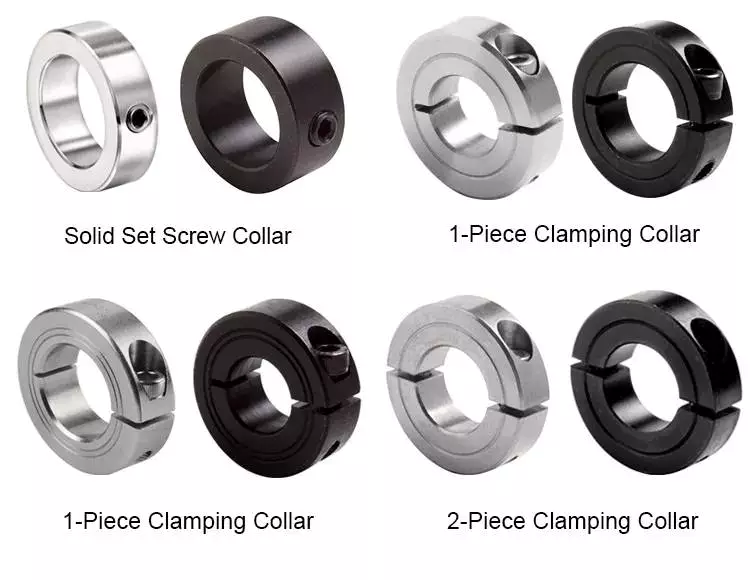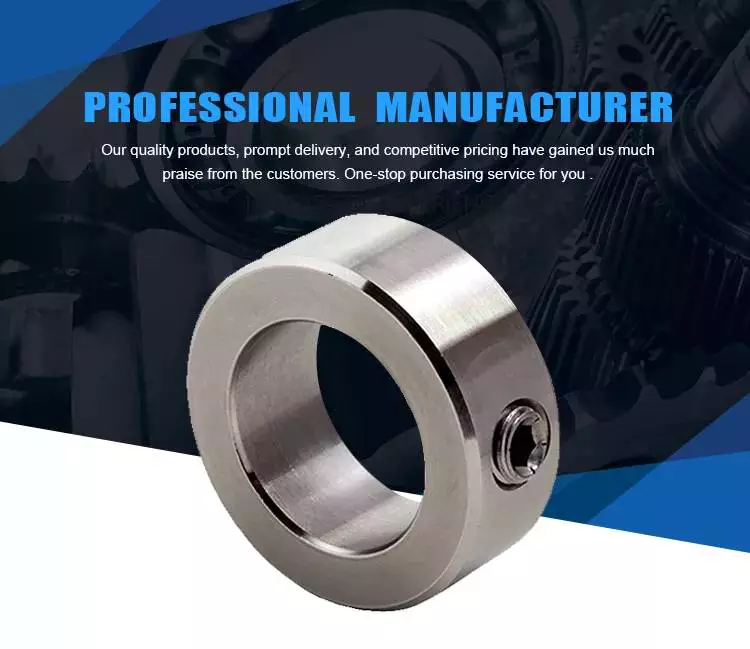Product Description
Product Description
Simply slide these shaft collars CZPT a shaft and tighten the screw to hold the shaft collar in place. Shaft collars are easy to adjust with their screws.
| Size | 1/8″ to 6″ and 3mm to 150mm. or non-standard according to your requirements. |
| Material | Mild Steel C20 C45 ,Stainless Steel SS304 316 , Aluminum |
| Process | CNC Turning, Forging |
| Size | 1/8”-1” OR Custom Sizes |
| Surface Treatment | Zinc Plated, Anodized, Black Oxide, etc. |
| Type | solid shaft collar |
| single split shaft collar | |
| doubel split shaft collar | |
| eccentric collar | |
| threaded shaft collar ( single split ) | |
| dimensions of S type split collar |
Detailed Photos
Catalogue
1) METRIC CZPT SHAFT COLLAR
2) INCH CZPT SHAFT COLLAR
3) METRIC SET SPLIT COLLARS
4) INCH SET SPLIT COLLARS
Packaging & Shipping
carton boxes+ export wooden box
FAQ
Q1: Are you trading company or manufacturer ?
A: We are factory.
Q2: How long is your delivery time and shipment?
1.Sample Lead-times: 10-20 days.
2.Production Lead-times: 30-45 days after order confirmed.
Q3: What is your advantages?
1. The most competitive price and good quality.
2. Perfect technical engineers give you the best support.
3. OEM is available.
| Standard Or Nonstandard: | Standard |
|---|---|
| Bore Diameter: | 4-50mm |
| Structure: | Flexible |
| Material: | Carbon Steel C20 C45 |
| Type: | Shaft Collar |
| Surface Treatment: | Zinc Plated or Black Oxide as Required |
| Customization: |
Available
| Customized Request |
|---|
Can I get recommendations for shaft collars suitable for use in harsh environments?
Yes, there are specific types of shaft collars that are designed to withstand harsh environments and provide reliable performance. When selecting shaft collars for use in such conditions, it is important to consider factors such as temperature extremes, exposure to moisture or chemicals, abrasive environments, and high vibration or shock. Here are some recommendations for shaft collars suitable for use in harsh environments:
- Stainless Steel Shaft Collars: Stainless steel shaft collars are highly resistant to corrosion and can withstand harsh environments with exposure to moisture, chemicals, or abrasive substances. They offer excellent durability and are suitable for applications in industries such as marine, food processing, chemical processing, or outdoor equipment where reliability and resistance to rust and corrosion are critical.
- Plated Shaft Collars: Plated shaft collars, such as zinc-plated or nickel-plated collars, provide an added layer of protection against corrosion and wear. These collars are often used in harsh industrial environments where exposure to chemicals, humidity, or outdoor elements is a concern. The plating helps to prevent rust and can extend the lifespan of the collars in challenging conditions.
- Shaft Collars with Seals or Gaskets: Some shaft collars are designed with integrated seals or gaskets to provide additional protection against moisture, dust, and contaminants. These collars create a barrier between the collar and the shaft, preventing the entry of debris or liquids. They are commonly used in applications where water or dust ingress is a potential issue, such as outdoor equipment, agricultural machinery, or industrial machinery in dusty environments.
- High-Temperature Shaft Collars: For harsh environments with high-temperature conditions, it is important to select shaft collars that can withstand the heat without deformation or degradation. High-temperature shaft collars, often made from heat-resistant alloys or ceramics, are designed to handle extreme temperatures. These collars are suitable for applications in industries such as aerospace, automotive, or furnace equipment where exposure to high heat is a concern.
- Specialized Coatings or Materials: In some cases, specialized coatings or materials can be applied to shaft collars to enhance their resistance to specific harsh conditions. For example, coatings such as Teflon or epoxy can provide additional protection against chemicals or abrasion. Additionally, certain materials like titanium or Hastelloy offer superior resistance to corrosion and can be utilized in highly corrosive environments.
When choosing shaft collars for harsh environments, it is recommended to consult with manufacturers or suppliers who have expertise in providing solutions for challenging conditions. They can offer guidance on selecting the most suitable collar materials, designs, and additional features based on your specific application requirements and the severity of the harsh environment.
Are there specific shaft collars designed for use in high-speed applications?
Yes, there are specific shaft collars designed for use in high-speed applications. High-speed applications require shaft collars that can withstand the rotational forces and vibrations associated with high speeds while maintaining secure and reliable shaft connections. Here are some considerations and features of shaft collars designed for high-speed applications:
- Balanced Design: Shaft collars designed for high-speed applications are often engineered with a balanced design to minimize the potential for imbalance and vibration at high rotational speeds. This helps ensure smooth operation and reduces the risk of damage to the collar, shaft, or associated components.
- High-Quality Materials: High-speed shaft collars are typically made from high-quality materials that offer excellent strength, durability, and resistance to wear. Common materials used include steel, stainless steel, or other alloys known for their mechanical properties and ability to withstand high-speed conditions.
- Precision Machining: To maintain the necessary balance and minimize potential runout, high-speed shaft collars undergo precise machining processes. This ensures that the collar has consistent dimensions, smooth surfaces, and accurate alignment for optimal performance at high speeds.
- Secure Clamping Mechanism: High-speed shaft collars often incorporate advanced clamping mechanisms to provide a secure and reliable grip on the shaft. These mechanisms, such as precision-machined set screws, high-strength clamping levers, or quick-release clamping systems, help prevent slippage or movement of the collar on the shaft during high-speed operation.
- Specialized Coatings or Treatments: Some high-speed shaft collars may feature specialized coatings or treatments to enhance their performance. For example, certain collars may have coatings that reduce friction or improve wear resistance, while others may undergo heat treatments or surface hardening processes to increase their strength and durability under high-speed conditions.
- Compliance with Standards: In some industries or applications, specific standards or regulations may exist for high-speed rotating equipment. Shaft collars designed for such applications may be manufactured to comply with these standards, ensuring that they meet the necessary performance and safety requirements for high-speed operation.
When selecting shaft collars for high-speed applications, it is important to consider factors such as the required speed range, load capacity, environmental conditions, and any specific industry or application standards. Consulting with manufacturers or industry experts can provide valuable guidance in choosing the most suitable shaft collars that meet the demands of your high-speed application.
What is a shaft collar and its role in mechanical systems?
A shaft collar is a mechanical component used in various applications to provide support, positioning, and locking functions for rotating shafts. It is a cylindrical device that fits around a shaft and is typically secured in place using set screws or clamping mechanisms. The collar is designed to prevent axial movement of the shaft and maintain its position within a mechanical system. Here is a detailed explanation of the role and significance of shaft collars in mechanical systems:
Support and Positioning:
One of the primary roles of a shaft collar is to provide support and positioning for a shaft within a mechanical system. It acts as a physical barrier that prevents the shaft from moving along its axial direction. By securing the collar at a specific location along the shaft, it helps maintain the desired position of the shaft relative to other components, such as bearings, gears, or pulleys. This support and positioning function ensures proper alignment and operation of the system, preventing unwanted vibrations, misalignment, or excessive wear.
Axial Load Distribution:
Shaft collars also help distribute axial loads along the length of the shaft. When a mechanical system experiences axial forces or thrust, the collar can help transmit and distribute these forces to the supporting components, such as bearings or thrust washers. By evenly distributing the load, shaft collars help prevent localized stress concentrations and improve the overall load-bearing capacity of the system.
Limiting Radial Movement:
In addition to preventing axial movement, shaft collars can also limit radial movement of the shaft within a given range. The collar’s design and tight fit around the shaft create a mechanical barrier that restricts radial play or shifting of the shaft. This is particularly important in applications where precise positioning or clearance control is required, such as in linear motion systems, conveyor systems, or machinery with rotating components.
Securing Components:
Shaft collars often serve as a means of securing other components onto the shaft. They can act as a stopping point or reference surface against which other elements, such as bearings, sprockets, gears, or pulleys, can be mounted. By securing these components with set screws or clamping mechanisms, shaft collars ensure their proper alignment and prevent unintentional movement or disengagement during operation.
Adjustability and Easy Installation:
Another advantage of shaft collars is their adjustability and ease of installation. They can be easily positioned and moved along the shaft without requiring complex tools or specialized equipment. This adjustability allows for fine-tuning of the shaft’s position and alignment within the system. Additionally, the simplicity of their design and installation makes shaft collars a cost-effective solution for various mechanical applications.
Overall, shaft collars play a significant role in mechanical systems by providing support, positioning, load distribution, and component securing functions. Their presence helps ensure the stability, alignment, and efficient operation of rotating shafts in diverse applications across industries such as manufacturing, automation, robotics, and machinery.
editor by CX 2023-11-27



